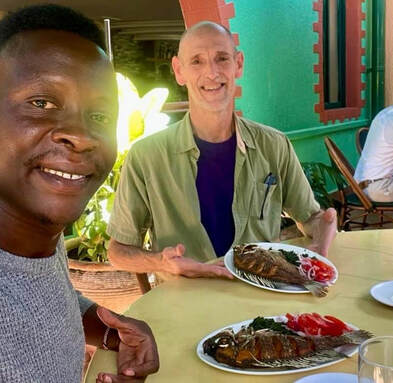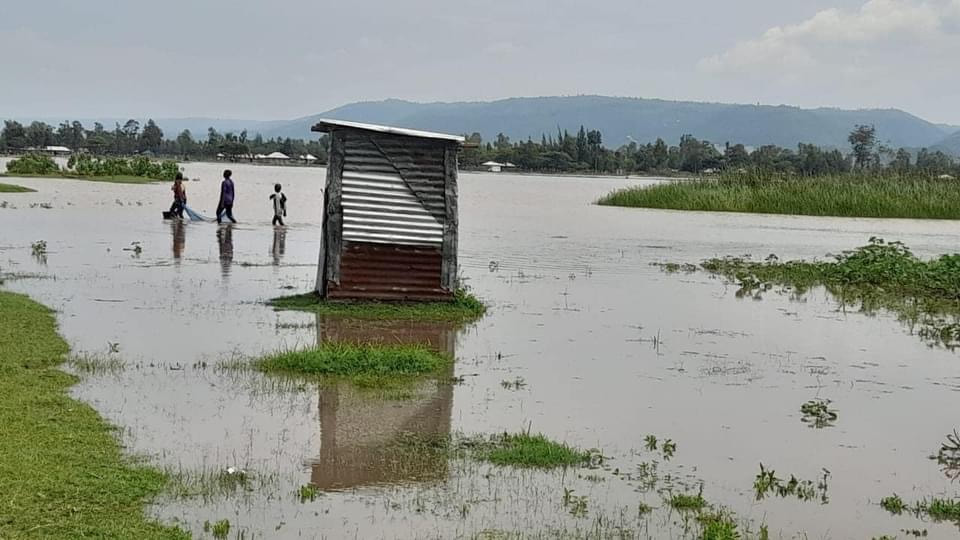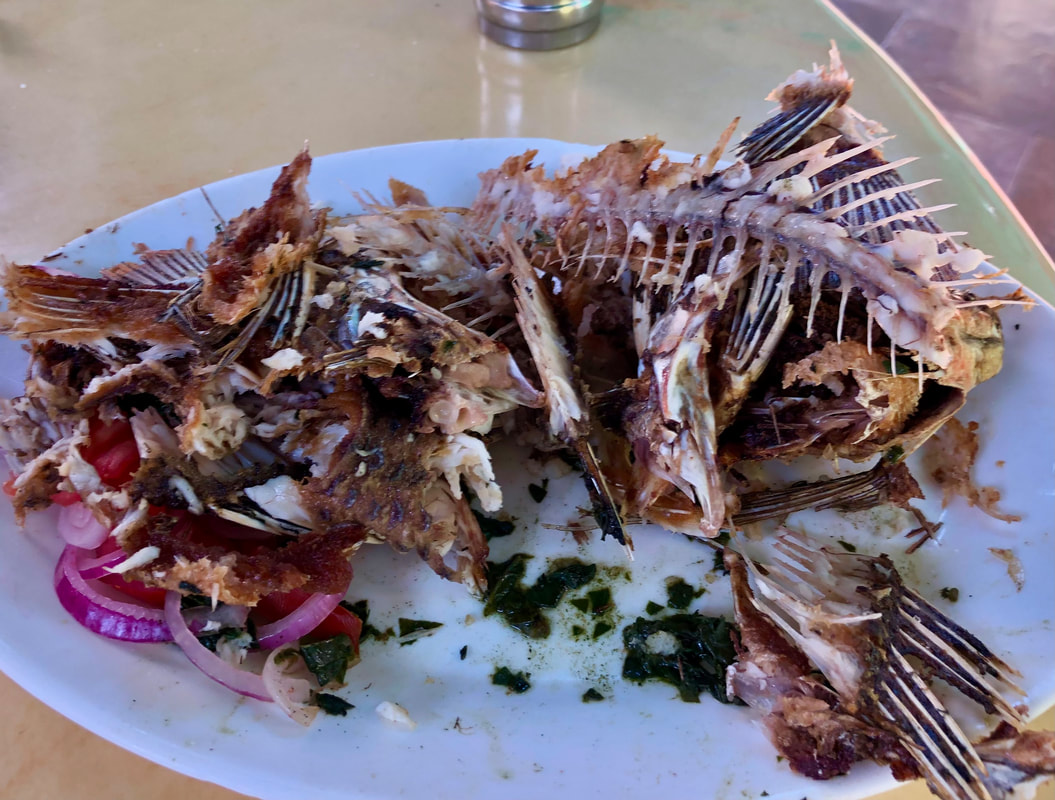
Months ago, I came upon a few posts by someone in an environmental FB group I’m in whose name appeared African. Later I noticed he made a few earnest and insightful comments on other posts I was also reading. I glanced at his profile and saw he was in Kenya, where I happened to be headed in February. One project he was working on was guiding young people in sustainable agriculture, another was tree-planting—both keen interests of mine. My instincts suggested we meet, so I friended him on FB and made loose plans to do so.
I was delighted to meet up with Jack Mazingira this week. It’s very heartening to come across young people who embody so many good qualities. Jack is sincere, bright, and has a noble vision tempered with a realistic awareness. He struck me as passionate, sensible, and wise for his thirty years. We spent several hours in an engaging conversation--sharing ideas, information, and getting to know each other and our cultures. All of which were interwoven with our views of the global situation.
Although there are aspects of Kenya similar to many industrialized democracies, and it has modern cities with contemporary cultural features, it’s difficult to convey the vast differences of a nation in such radical transition. Just as America is still struggling with our Puritan religious heritage, racist history, and misguided embracing of “consumer culture” rather than an open-minded, tolerant society based on community and love, Kenya also has traditions and a history that often handicaps and hinders its healthy evolution.
A primary virus now become global is the misleading concept of never-ending, unrestricted economic growth as a goal — despite the absurdity this requires an infinite supply of our finite natural resources.
To this end, Jack has taken on the term “de-growth” as an economic model. Not a cessation of all technology or all modern conveniences, but a recalibration; a reframing of what is necessary, sustainable, and enough.
Living in Kenya, a nation eager to catch up to the economic status of more developed countries, you can imagine the challenges. But I agree with him in all ways, including it needs to be a concept taken to heart by America and other major powers if we are to begin to lessen the current crises and larger ones looming. Like it or not, our way of life is gobbling up resources and causing suffering of humans (and all beings) far more than less-developed nations. The great irony of course is even as others are striving to be like us, I’m unconvinced our way of life makes us any happier.
Jack was spurred to recognize and address the impacts of the environmental crisis through personal experiences — within his lifetime his village near Kisumu has endured steady floods on a scale it never before experienced. The results of these exacerbate the already frail farming and fishing communities and their lifestyle.

Ubuntu: “…an African philosophy that places emphasis on 'being human through other people'. It has been succinctly reflected in the phrase I am because of who we all are.” ~ Jacob Mugumbate, “Exploring African Philosophy
In essence he sees the interconnectedness of all life on the planet and wants to be of service. I suggested a key aspect to many issues across the globe is related to the way humans relate to each other and the world. When these are in a healthy (admittedly rarely perfect) more sustainable balance everything thrives better, when there are gross imbalances, as we all can sense and today can often scientifically quantify, it all spirals into illness and decline. The earth will of course recalibrate, but not within a human timeframe. And, we agreed, why not mitigate the amount of suffering if we have the chance?
Smartly, he has already learned you cannot simply impose a “healthy paradigm” on entrenched habits or cultural traditions. Nor is there a single solution to remove problems that often have several causes. I feel we continue to make the grand mistake of thinking of everything in mechanistic terms when the sources and solutions are of more fluid, organic nature. This is conspicuous in our approach to medicine, food, even the value we assign to humans, animals, plants and all natural resources. Further, due to scale and power of our technologies and nations, many of the problems have sources far away from the places where they manifest.
IE: effects of flooding in his village from climate issues are interwoven with the delicate subsistence state of many lower economic communities, and related to lack of opportunity, poverty and the exploding Kenyan (& pan-African) populations, as well as arcane traditions, and larger more powerful nations spewing CO2, methane and other emissions. (We both recognize “green-washing” and the problems linked to accessing minerals for alternative energy sources for current technologies, but feel fossil fuels are the most pressing concern. Rather than using long-term issues as rational for not addressing immediate problems, we have to begin somewhere.)
To my admiration, in his multi-pronged approach, Jack is trying to educate his village, guiding young people to farm sustainably, and planting trees, working with elders, adults, and young people, and aiming to establish a school for future generations. He’s also courageously willing to take on his rural cultural traditions, such as those which suppress opportunities for women (“suitable only for producing babies and cooking”) and view multiple wives and large families as symbols of male power. He knows these handicap everyone, and worsen the crises by adding more mouths to feed. It may have served a social purposes of a few in another era, but pragmatically it’s not helping the community at large.
There are terrible legacies of colonialism across this continent, worsened by the European nations lack of assisting the local peoples on how to exist and govern after they left (the US played a variation that stifled African national independence as well, usually under the guise of anti-communism). It’s crazy to expect equitable nations to flourish within arbitrary boundaries the colonizing heads dictated, ignoring cultural identities. (Regrettably a similar attitude still exists; consider the GWBush/Cheney philosophy applied to Iraq.) Jack is keenly aware of how the insecurities among tribes (what we might term indigenous cultures) post-colonialism promoted and further complicate the situation. There’s an attitude among many of the 55 tribes here that if one’s tribe is in power they are to “own” that power and use it to the detriment of all the others, rather than empowering them all tribes. It’s the “good ol’ boy” network that we’re familiar with in US, writ large and more conspicuously across all of Kenyan government.
This has played out nationally since the Brits left, with the Kikuyu (who rebelled against the Brits in 1952) granted power in 1962. They directly and indirectly repressed all other tribes and have accumulated (often through corruption) land across enormous regions. The impact indirectly trickles down to localities. Jack’s parents were killed when he was young in part because this attitude pushes people’s insecurity to a degree that makes fighting (and killing) to gain access to land (the only security for farmers) a real event.
We have our own variations of all of these negative traits in the US. I fear similar toxic divisive motivations are on the rise in US. However, in nearly every direction they’re still not as severe nor (usually) on such an overt and tragic scale. Although I have to admit the consolidation of power, control, and influence of our US system and our society in the hands of a few, as well as our unconscious embrace of the distractions of consumerism, have me very concerned.
I mentioned (and he respectfully agreed) the wasteful, selfish, and arrogant way we in the US relate to the other life forms, other cultures, and the natural resources across the globe is awful. He commented that he feels strongly there’s even a symbolic value in the solution, since we (America) are a primary role model for so many nations; we set the standards many in the less developed world aspire to attain, and how we act on all the issues above sets an example—healthy or not.
How do we find and integrate solutions that respect cultural identities and embrace reality of ongoing change? Anna Lowenhaupt Tsing in “The Mushroom At the End of the World” (which I’ve only begun reading but highly recommend) points out rather than becoming more fearful of the “other”, and insecure by intermixing of cultures, there are plenty of instances in the natural and cultural worlds where we all benefit from what we might view as, in her elegant phrase “Contamination as Collaboration.”
We face enormous challenges. Still we concluded it’s better to apply energy toward making the world better than adopt an attitude that enables harm. We all have to choose the best ways to engage, and all things done with sincerity and kindness are important, from global to local to personal.
Jack is a bit unusual as a Kenyan in that he avoids red meat and “is mostly vegetarian, with some fish.” He also has decided if he has a family he will limit it to one or two children. Both of these choices are based on the ecological impacts. Yet he is not extremist and recognizes the nuance of life. We both never want to stop appreciating the genuine richness and beauty it offers. After the first few hours of our discussion over coffee, in a gesture to his own traditions, he invited me to join him for lunch at a restaurant offering foods of his Luo heritage. We enjoyed ugali, onions, tomatoes, steamed greens, and of course, Tilapia. Which, as I knew from previous dinners here was savored best in good Kenyan company, eating with one’s fingers.
www.towardsgreenenvironment.org

 RSS Feed
RSS Feed